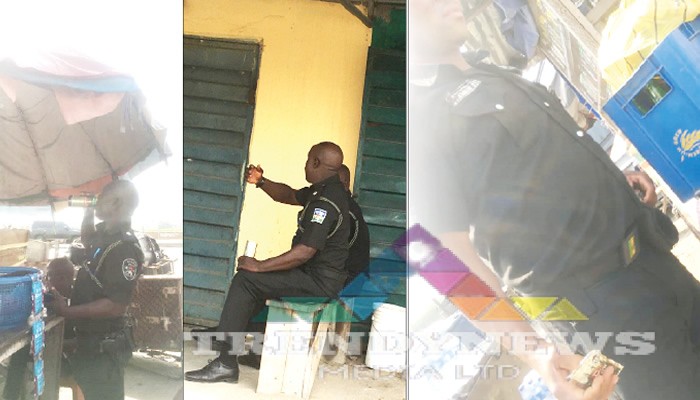
Regular alcohol usage by police officers assigned to the Ajiwe Police Division in Ajah, Lagos State, may be to blame for the rise in the number of extrajudicial executions carried out by officers from the station.
Investigations have shown that police officers frequently drink while on duty and while on patrol.
They said that this may have been the cause of the recent murder of Bolanle Raheem, a pregnant lawyer, by station-affiliated Assistant Superintendent of Police Drambi Vandi.
Gafaru Buraimoh, a local who was on his way to get fuel, was also shot dead by an inspector from the same division, Imeh Johnson, two weeks prior.
When our correspondent visited the police station on Tuesday around 10am, some of the officers were seen clustered in pairs outside the premises.
A closer observation revealed some of them consuming alcohol in sachets, while heavily armed.
One of the two officers was observed carrying a glass cup of beer, which he sipped periodically as he sat close to a barbershop linked to a building beside the station.
A police officer with a weapon strapped to his waist was observed drinking from a can as another group of officers took cover underneath a shed next to the station.
While some of the sellers near the police station put certain alcoholic beverages within the reach of the officers, other cops avoided inquisitive eyes by travelling a distance to patronise other vendors.
After nearly an hour of watching this, a fair-looking cop who had been observed previously pacing the station’s hallway beckoned to our reporter.
Close contact with him showed that he was drunk, as his body reeked of alcohol.
While this reporter thought he was about to be questioned about his presence around the police post, the policeman, who sounded incoherent, requested a sum of N200.
Out of curiosity, the reporter gave him N1,000 in expectation of his balance.
The police brought him to a seller right away, bought a sachet of alcohol, and downed it while the vendor gave him the rest of the money.
We also discovered that the police frequently visited several alcohol merchants who were located behind a car park underneath the Ajah Bridge, where Raheem was fatally shot.
When some police officers arrived to service a female customer who had been discovered at a corner beneath the bridge, our correspondent, who had visited the location and interacted with some of the street kids, watched as they were cheered by the children.
Soliu Adekanmbi, a local, claimed that the officers were well-known for abusing alcohol in public.
He said, “The officers do things the way they like and nobody is checking them. It looks like nobody can confront them. Most of them are always with alcoholic packs while on duty. They drink them here under the bridge while in uniform. It is what everybody knows, but no one can say anything since the police authorities have done nothing about it.”
Our correspondent also gathered that most of the policemen had spent a long time in the area and had refused to be transferred.
A community development association chairman, who spoke on condition of anonymity because of the sensitive nature of the issue, said this had contributed to their excesses in the community.
He said, “Most of the police officers have turned this community into their permanent place. Most of them rise through the ranks to retire here. That is why they have become uncontrollable. Some have spent between 15 and 20 years in the station. Anytime a transfer comes, they manipulate it. They know who to settle. Even in Langbasa Police Station, there is one Supol Sunday and one Inspector Yomi and up to 10 of them who have spent up to those number of years. They do not want to leave the station because of pecuniary gains. When the first incident happened, they changed the DPO. But the one that happened on Sunday shows it is not about changing DPO but the policemen.”
The Executive Director of the Rule of Law and Accountability Advocacy Centre, Okechukwu Nwanguma, said drinking on duty contravened the Police Act of 2020.
He said, “The Police Act 2020 is very clear on the use of alcohol among police officers. It prohibits police officers from drinking alcohol while on duty. It also provides penalties for persons offering or selling alcohol to police officers on duty. Drug use and abuse among security agencies, including the police in Nigeria is very high. Police officers in uniform enter beer parlours with arms, sit and drink alcohol. This is prohibited under the law, but it has become a usual spectacle.
“There is no other way to explain what has happened to the woman (Raheem) order than that the officer acted under the influence of alcohol, because how do you explain that a police officer would simply pull a trigger on a woman who was not armed?
“One of the issues that came up after #EndSARS was the need to do a psychological evaluation of police officers, especially those who handle arms to be sure that they are mentally stable. But this did not happen. Even the recruitment procedures have been compromised. People who are unfit find their way into the police because the guideline for recruitment is circumvented. There is the need for a genuine commitment to implement reforms that address these problems, as well as competent leadership both at the level of the police and at the political level.”
According to the state Police Public Relations Officer, Benjamin Hundeyin, it is an offence to drink on duty.
He said, “If a police officer is drunk while on duty, it is a disciplinary offence and there are laid down procedures dealing with such a person. It is the duty of the DPO or any officer that discovers the same to bring him for disciplinary action.”



